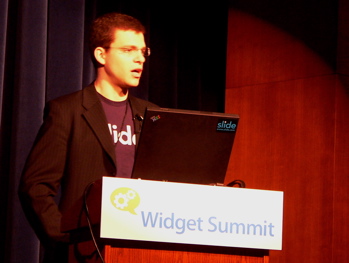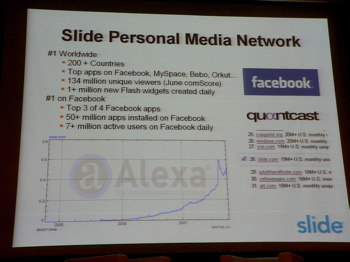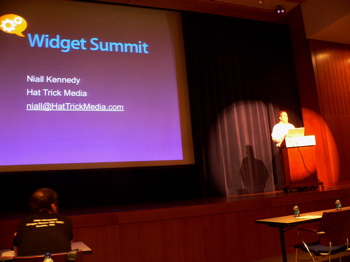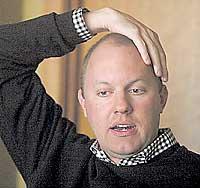The well-known founder of widget leader Slide (and formerly a cofounder and CTO of PayPal), Max Levchin is the closest thing there is today to a rockstar in the nascent world of widgets. Slide had 134M uniques in June according to comScore. 
He noted that Slide has three of the top four apps on Facebook: TopFriends, FunWall, and SuperPoke. Gee, check out all the things you can do to your friends on that last one! Max said Slide is now working a lot on monetization, and doing well (movie promos, etc). Most people would agree that Slide seems to be mostly about "MySpacing" Facebook. But, that may not be a bad thing — because, with its numbers, it’s likely to be the widget company that most quickly figures out how to make money in this game, working with the advertisers that will be the main route to that $$ –and they already are very much talking to them, running lots of trial campaigns to prove their worth. Other than that, I didn’t understand a whole lot of what Max said….he talks really, really fast.
Category: Utility Computing/Web Services/SaaS (Page 7 of 8)
Niall Kennedy kicked off his second annual event by telling us that we’d be hearing 33 speakers and some 27 hours of programming (!) over the next two days. Totaling up all the breakouts, I guess. He talked about the Vista Sidebar, now out 9 months, for which there’s already 1500 widgets….and about Mac OS Leopard (rumored to be coming Oct 26), which will have a button in the browser now to create a widget for you (and he noted the Mac OS is up to 3200 desktop widgets now after two years). 
He said Leopard will have a brand-new widget IDE that "will make things a lot easier" and a desktop widget that will "grab stuff on the web for you, so you see it in shrunken form." He noted that, in line with Newsweek declaring 2006 the "Year of the Widget," there’s really been a proliferation of widgets on personal home pages, in blog sidebars, and in social networks.
I’m in SF right now sitting in a Starbucks, ready to head over the Widget Summit, which goes through tomorrow. Check out the sessions and the schedule and tell me what you think. 
Which talks or panels would you most like to sit in on if you were here? What questions would you have for the speakers? Use me — I’m your intrepid conference reporter!
I’m all yours, and I’m all ears….

Seems a little deal has been brewing. He just got rich — again. This just in from the Wall Street Journal:
Hewlett-Packard agreed to acquire software maker Opsware for $1.45 billion as the PC giant continues to bulk up its non-hardware offerings. Opsware was co-founded by Marc Andreessen, the young brain behind Internet pioneer Netscape.
Not that he wasn’t already rich. Why does this guy even need to work, anyway? I guess he’s still too young to know any better…. 🙂
Here’s Marc new blog if you haven’t seen it yet. Where he reminds us that the deal was for all cash. Several bloggers, myself included, have been going on and on lately at how great a job he’s been doing with his blogging — really some nice, long, thoughtful pieces, tips about raising VC, etc. (I’ve cited them somewhere on one of my blogs — forget where right now). Suddenly he was being so generous with his time! Sure, he has a great CEO running his popular new firm, Ning (which, by the way, just announced a $40M+ VC infusion).
But I say, hooray! He gets richer, and we all get to benefit more from his great writing — his new career of blogging. Go for it, Marc….
It’s a gorgeous day in San Francisco, and I arrived at Moscone West about 11:00 am to find it one crowded place. Still trying to get my bearings, and starting to run into people I know…  But I was able to bop right into one session before lunch: “Open Source Business Models for Web2.0.” John Roberts, CEO and cofounder of SugarCRM, told us about the non-traditional way his company started: really as a project, then it wasn’t incorporated for almost two years. Funding came even later. “Companies are starting differently these days,” he said. Now, SugarCRM has 100+ employees, 1200 customers in 30 countries, 100,000 users, and 7000 registered developers. How are they 2.0? “We sell subscriptions, not licenses,” he said. “And, as Tim O’Reilly would define it, we trust our users as co-developers.”
But I was able to bop right into one session before lunch: “Open Source Business Models for Web2.0.” John Roberts, CEO and cofounder of SugarCRM, told us about the non-traditional way his company started: really as a project, then it wasn’t incorporated for almost two years. Funding came even later. “Companies are starting differently these days,” he said. Now, SugarCRM has 100+ employees, 1200 customers in 30 countries, 100,000 users, and 7000 registered developers. How are they 2.0? “We sell subscriptions, not licenses,” he said. “And, as Tim O’Reilly would define it, we trust our users as co-developers.”
Sharing this session with Roberts was Marten Mickos of MySQL. The Web2.0 motto, he said, should be “Fail fast, scale fast” — alluding to how software iterations and testing can be so much faster today. He said MySQL is now up to 50,000 downloads per day. He guesses there are about 30 million developers on the ‘Net today. “That’s 100x my estimate of the number of developers it took to get us this far in the current information society.” He noted that his closed-source competitor has 56,000 paid employees “who go to work each day whether they like it or not.” Whereas MySQL has “50,000 new, passionate amateurs volunteering to help make our product better every day.” Mickos then gave us a rundown of the Web2.0 business models he sees today: (1) do it as a hobby and have fun, (2) get acquired, (3) build traffic and sell ads, (4) build a virtual world and sell premium goods, or (5) build a service and sell subscriptions.
An audience question at the end was interesting, addressed to both speakers: “What’s your revenue per employee?” To which Mickos had this to say: “Neither of us is operating at scale yet. We’re both very popular, but we’re still not at potential as a business model.” Roberts of SugarCRM added: “We’re building our brand.”

Recent Comments